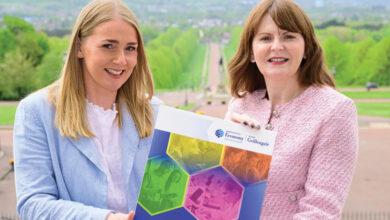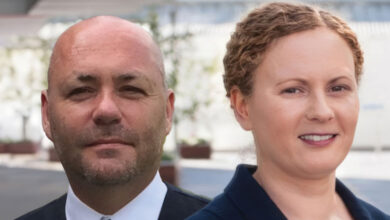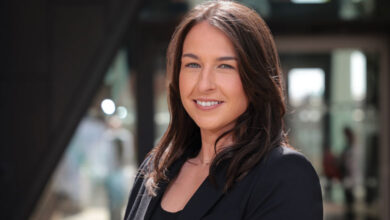Fresh focus on mental health and hearing
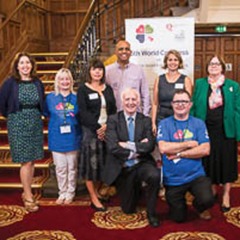 The World Congress on Mental Health and Deafness came to Belfast for the first time last month and highlighted the often silent experiences of people with hearing loss. Peter Cheney reports.
The World Congress on Mental Health and Deafness came to Belfast for the first time last month and highlighted the often silent experiences of people with hearing loss. Peter Cheney reports.
Two largely hidden health problems were the focus of a major conference in Belfast in September, which again affirmed Northern Ireland’s hospitality and its ability to host large scale events. Around 400 delegates attended the 6th World Congress on Mental Health and Deafness, co-ordinated by Brian Symington, who previously led the RNID and Action on Hearing Loss in Northern Ireland. Symington is now a consultant for Jordanstown School, which caters for children who are deaf or visually impaired.
The conference – themed ‘A Pathway to Rights’ – was opened by OFMDFM Junior Minister Jonathan Bell. The event also coincided with the 10th anniversary of the formal recognition of British sign language and Irish sign language in Northern Ireland.
Consultant psychiatrist Margaret du Feu had lost her hearing when studying medicine at Cambridge and was appointed to lead the scientific committee for the conference. She set up the first mental health service for deaf people in Northern Ireland and now lives in the province. Previously, people requiring this service had to travel to Manchester and her attitude was “if nobody else will do it, I will do it.”
Du Feu added: “We are here to share, to learn from each other and to help all our friends and colleagues and fellow citizens along a pathway to rights.”
Ines Sleeboom-van Raaij, President of the European Society for Mental Health and Deafness (ESMHD), recalled that when the previous conference closed in Mexico in 2012, there was no obvious venue for the next one. Brian Symington stepped forward later that year and suggested Northern Ireland.
This idea was taken up by the society’s executive and Raaij was surprised by “such a remarkable positive reception” for the idea when she visited the province. The presence of a “really strong” deaf community was also welcome along with the support given by the 30 sponsors including NIE, the Lagan Group and Phoenix Gas and many volunteers who helped to put the event together. “An overwhelming sense of hospitality” stood out.
Brian Symington was pleased that the momentous journey over the last two years meant it was now really “our place, our time” in Belfast. The event was a collaboration between the ESMHD, Queen’s University Belfast and the Royal College of Psychiatry.
Addressing the gala dinner, then Health Minister Edwin Poots acknowledged “I can only imagine what it would be like to become deaf now, how my life would become very different. I would need to learn new ways to interact with my friends, family and colleagues.”
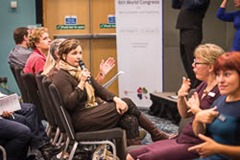 The social isolation and loneliness experienced by deaf people can lead to anxiety, depression and other mental health problems. Social workers had a particular role in helping the person to “remain connected within their families and communities” and ensuring that their voice is heard.
The social isolation and loneliness experienced by deaf people can lead to anxiety, depression and other mental health problems. Social workers had a particular role in helping the person to “remain connected within their families and communities” and ensuring that their voice is heard.
Keynote speaker Liisa Kaupinnen won last year’s UN Human Rights Prize and is a former President of the World Federation of the Deaf. She explained that a binding Convention on the Rights of Deaf Persons with Disabilities was being prepared. Despite an explosion in the use of sign languages, there is still very little factual information in sign language about the important questions of life.
A ‘Belfast declaration’ on deafness and mental health is now being drafted, drawing on the principles of Northern Ireland’s forthcoming Mental Capacity Bill. Roy McClelland, Professor Emeritus of Mental Health at Queen’s, said that Northern Ireland was “leading the world” in ending discrimination against the mentally ill. The Bill will give everyone the right to accept or refuse treatment, unless it is established they do not have the capacity to make the relevant decision.
Brian Symington was impressed by the “breadth of communications” used: orally, through sign languages, and through the use of speech-to-text transcription and social media. After the event, parents at the Jordanstown School had a ‘meet the experts’ session, which included a contribution from Jan van Dijk, one of the world’s leading specialists in deaf-blindness.
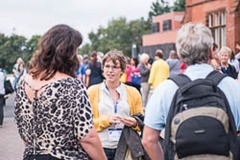 In a follow-up to the congress, Michael Schwartz leads the Disability Rights Clinic at Syracuse University. As young as three years of age, he was aware of the stigma attached to deafness. He only learned to sign when he was 22 but found this to be a healing experience, which gave him the confidence to become a civil rights activist and lawyer.
In a follow-up to the congress, Michael Schwartz leads the Disability Rights Clinic at Syracuse University. As young as three years of age, he was aware of the stigma attached to deafness. He only learned to sign when he was 22 but found this to be a healing experience, which gave him the confidence to become a civil rights activist and lawyer.
As a Fulbright scholar, he will be moving to Queen’s in January to research the relationships between doctor, deaf person and care provider in the health care setting.

